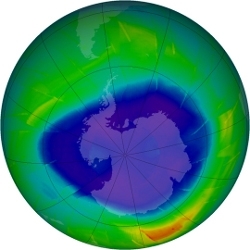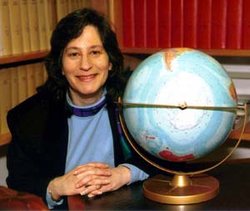Susan Solomon
Solomon, Susan
Susan Solomon is an Atmospheric Scientist with the National Oceanic and Atmospheric Administration. She completed her doctorate at the University of California in Berkeley, California, in 1981. Her research has focused on the role of atmospheric chemistry in climate dynamics. Specifically, she has conducted numerous investigations of photochemistry and of transport processes in the upper atmosphere (Atmosphere layers) (that is, the stratosphere and troposphere). Her most recognized work has involved remote sensing of the atmosphere through innovative use of spectroscopic methods. This work has revolutionized our interpretation—and our theoretical and practical understanding of ozone depletion; in particular in the polar regions. Her antarctic investigations employed ground-based visible absorption techniques that monitored ozone, nitrogen dioxide and chlorine dioxide. Significantly, Dr. Solomon's work has guided and strengthened the work of scientists worldwide in filling gaps in assessing and understanding the complexities of climate change.
Twenty years ago, during the antarctic winters of 1986 and 1987, she led the National Ozone Expedition at the National Science Foundation's McMurdo Station. That work included pioneering observations on how chlorofluorocarbons affect ozone concentrations (that is, decreases in concentration known popularly as the antarctic ozone hole). Two antarctic geologic features—Solomon Glacier (78°23'S, 162°30'E) and Solomon Saddle (78°23'S, 162°39'E)—were named in honor of her Antarctic research in l994. In 2000, Dr. Solomon was awarded the National Medal of Science by President William Clinton for observing and explaining the yearly genesis of the antarctic ozone hole. She was awarded a 2004 Blue Planet Prize for work that identified the mechanism that lead to the antarctic ozone hole and for science-based evaluations underlying protection of the Earth's ozone layer. In 2006, she was named a Fellow of the Royal Society of Chemistry, and she received the V.M. Goldschmidt Medal from the Geochemical Society. Her interests include history and she authored The Coldest March recounting the circumstances surrounding the hardships experienced during Robert Scott’s tragic expedition to Antarctica in 1911. In 2008, Dr. Solomon was elected a Foreign Member of The Royal Society of the United Kingdom.
In September 2010, in recognition of her pioneering work that altered the course of atmospheric research, she was awarded the Career Achievement Service to America medal at a White House ceremony.
See a short video about Dr. Solomon's work.
Editor's Note
- Also, see: Susan Solomon: Service to America Medalist in the Encyclopedia of Earth.

